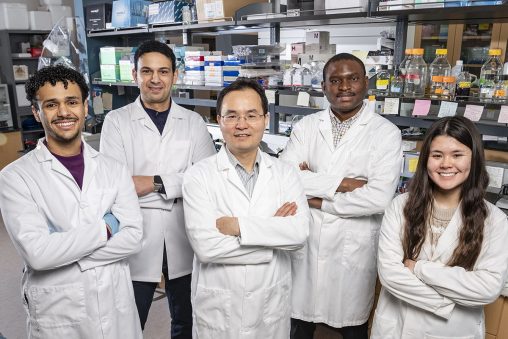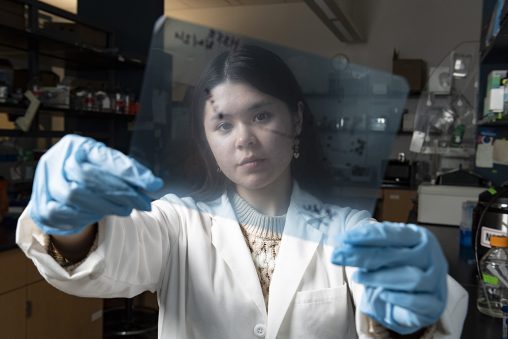
From left: biochemistry and molecular biology graduate students Seth Murdock and Abdul Alagili; Weiwen Long, associate professor and associate chair of biochemistry and molecular biology; biochemistry and molecular biology graduate student Rangarirai Makuku; and biological sciences major Phylicia Carpenter. (Photo by Erin Pence)
Weiwen Long, Ph.D., associate professor and associate chair of biochemistry and molecular biology, says that better understanding the protein, called FBXL16, could one day help patients for whom such hormone therapies do not work.
Long received a $450,000 grant from the National Cancer Institute to examine how FBXL16 affects patients who have estrogen receptor-positive breast cancer, which is stimulated by the hormone estrogen.
This form of breast cancer is treated with endocrine therapies, including selective estrogen receptor modulators, such as tamoxifen, which block hormones from attaching to receptors on cancer cells; aromatase inhibitors, such as letrozole, which decrease the body’s production of hormones; and selective estrogen receptor degraders, such as fulvestrant, which deplete estrogen receptor protein.
While these drugs are effective at treating estrogen receptor–positive breast cancer, about 30% of patients are resistant to the drugs or eventually develop resistance to the medication.
“There is an urgent need to identify new drugs that may regulate estrogen receptor activity, and hopefully, we’re able to develop drugs for treating estrogen receptor-positive patients, particularly those with estrogen receptor mutations,” said Long, who earned a Ph.D. in structural and cellular biology from Tulane University and did postdoctoral training at the Baylor College of Medicine in Houston.
Long’s research indicates that FBXL16 could play an essential role in the regulation of estrogen receptor signaling and that knocking down FBXL16 could inhibit the growth and spread of estrogen receptor-positive breast cancer.
More importantly, Long found that FBXL16 may cause resistance to endocrine therapies, so inhibiting FBXL16 in breast cancer cells could increase the effectiveness of endocrine therapies in more patients.
One of the goals of Long’s research project is to understand the molecular mechanism for how FBXL16 works, which could lead to the development of drugs to inhibit estrogen receptor protein in patients.
In another research project, Long and Marion Morel, Ph.D., a postdoctoral researcher, found that FBXL16 promotes growth and drug resistance in lung adenocarcinomas with KRAS mutations.
“We are interested in FBXL16 in different cancers,” Long said. “Ideally, if we can confirm FBXL16 is an oncoprotein, our ultimate goal is to develop a drug to treat different cancers, including breast cancer and lung cancer.”
Assisting Long in the research project is Abdul Alagili, who is pursuing a master’s degree in biochemistry and molecular biology and works as a graduate research assistant in Long’s lab.
Alagili is originally from Tripoli, Libya, where he was a veterinarian. He diagnosed many cancer cases in dogs, which often faced limited treatment options, so Alagili decided to pursue a career as an oncologist.
He said he is excited to work with Long on a new line of research investigating FBXL16.
“That’s what makes me passionate about the project and excited about it,” Alagili said.

Weiwen Long received funding to support undergraduate students like Phylicia Carpenter, a biological sciences major, to participate in his breast cancer research.
Phylicia Carpenter, a biological sciences major, and Bailey Trawick, a biochemistry and molecular biology major, are working on the project in Long’s lab.
The project will expose the undergraduate students to cancer research and teach them important research skills, Long said.
“We do need highly motivated and passionate young scientists, and that’s one of the challenges we have right now,” he said. “It’s good to get the students interested in cancer research early in college.”

 Wright State, Premier Health hosting surgical symposium for high school and undergraduate students
Wright State, Premier Health hosting surgical symposium for high school and undergraduate students  Wright State joins nation in celebrating first-generation students
Wright State joins nation in celebrating first-generation students  Education grant connects Wright State students with Dayton Regional STEM School for instructional education partnership
Education grant connects Wright State students with Dayton Regional STEM School for instructional education partnership  Wright State recognized among top public universities in latest U.S. News Best Colleges Rankings
Wright State recognized among top public universities in latest U.S. News Best Colleges Rankings  Nearly 1,000 students and alumni turn out for Wright State’s Fall Career and Internship Fair
Nearly 1,000 students and alumni turn out for Wright State’s Fall Career and Internship Fair 